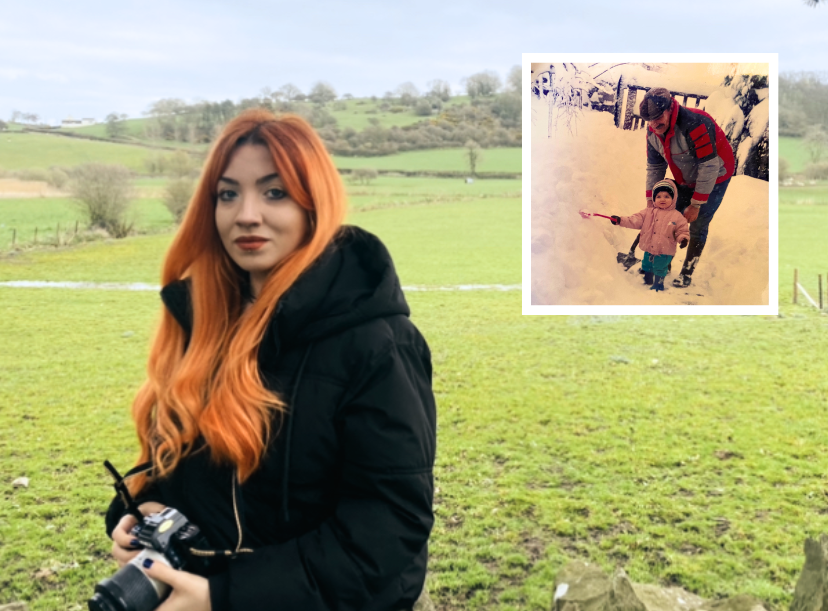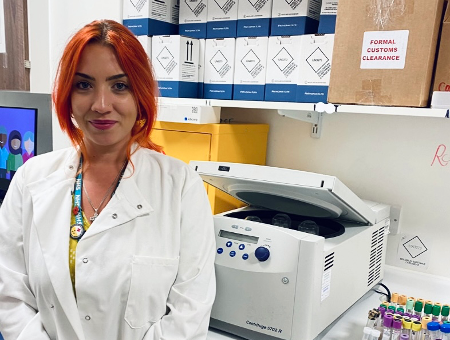‘The end of my dad’s life with Parkinson’s was traumatic. I don’t want others to suffer like him’

If you’ve heard of Parkinson’s, you might be aware of the most common symptoms. People living with the condition often have a tremor, are slow moving and struggle with muscle stiffness.
The symptoms occur because nerve cells that produce dopamine in the brain stop working. Over time, as more cells are lost, the patient’s symptoms worsen.
Parkinson’s is the fastest growing neurological condition in the world. In the UK, one in 37 people alive today will be diagnosed in their lifetime. And yet, there are very few treatments available. Doctors have many questions about what causes Parkinson’s, and how we should deal with it.
For Our Future Health volunteer Leah Wright, 29, from London, that’s something that needs to change.
‘A sad condition’
Leah was just ten years old in 2005 when her dad, John, discovered he had Parkinson’s.
John was in his 50s at the time – relatively young for a Parkinson’s diagnosis (the disease most commonly develops after the age of 60). Leah remembers how, to begin with, he “just got on with it. He was a stoic northerner – he was always outside gardening.”

In the years that followed, John’s condition deteriorated, and he started to struggle with daily tasks. “The last four years of his life were especially terrible” says Leah. “My mum became his full-time carer. He couldn’t turn left or right and struggled to get around the house on his own. It would take him an hour just to get up onto his legs in the morning.”
John passed away in 2023. He was 77-years-old.
“My dad’s end to life was long, drawn out and traumatic,” says Leah. “Parkinson’s is such a sad condition. It’s just so unfair.”
Answering the unknowns
As a cancer researcher, Leah knows how far healthcare has come for many diseases. She believes Parkinson’s has a long way to catch up.
“We’re so far behind in what we understand about it,” she says. “Dad was given various drugs to help ease his symptoms but beyond that, there were no other treatments available. I was quite shocked. Compared to the treatments available when someone is diagnosed with cancer, there are so few options.”

There are also gaps in our understanding of what causes the disease. Very little is known about the cause of Idiopathic Parkinson’s (the most common type of the disease), although researchers believe it could be a combination of age, genetic, and environmental factors.
Dr Michael Cook, Executive Director of Science at Our Future Health, explains how our programme will help researchers fill in the gaps: “By recruiting up to five million volunteers across the UK, Our Future Health will enable research into Parkinson’s disease. We will have a number of existing (prevalent) cases in the recruited population, as well as many new cases that are diagnosed during follow-up (incident cases).
“Polygenic and integrated risk scores will enable researchers to identify who is at higher risks of developing Parkinson disease. In addition, the blood samples that we store securely will enable studies to discover and validate diagnostic markers of Parkinson’s.”
Act today to help tomorrow
The chance to improve Parkinson’s healthcare motivated Leah to volunteer for Our Future Health.
“I hope this programme leads to earlier detection of Parkinson’s,” she says. “Volunteering means researchers can learn more about the causes and treatment of Parkinson’s. It will mean a less painful end to life for those with the condition in the future.
“If a 20 minute appointment is all it takes to improve things for those in the future, it’s surely worth it.”
For more information about Parkinson’s visit parkinsons.org.uk. Parkinson’s UK is an affiliate charity of Our Future Health.

Let’s prevent disease together
By volunteering for Our Future Health, you can help health researchers discover new ways to prevent, detect and treat common conditions such as diabetes, cancer, heart disease, stroke and Alzheimer’s.